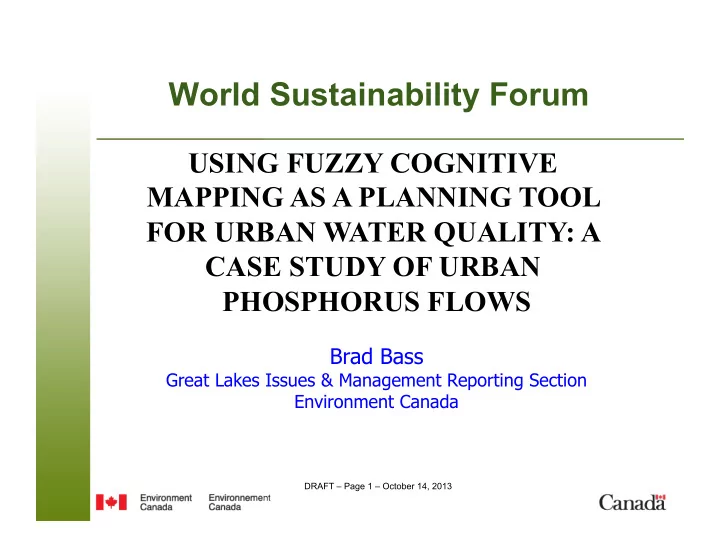

World Sustainability Forum USING FUZZY COGNITIVE MAPPING AS A PLANNING TOOL FOR URBAN WATER QUALITY: A CASE STUDY OF URBAN PHOSPHORUS FLOWS Brad Bass Great Lakes Issues & Management Reporting Section Environment Canada DRAFT – Page 1 – October 14, 2013
The Great Lakes Water Quality Agreement – centerpiece of action DRAFT – Page 2 – October 14, 2013 ‐ 3 ‐
GLWQA Annex 4 Nutrients Commitments • Lake Ecosystem Objectives • Establish phosphorus objectives, loading targets and allocations for each lake • Implement programs and other measures to manage excess phosphorus • Identify priority watersheds for nutrient control and develop management plans for these watersheds • Develop phosphorus reduction strategies and domestic action plans DRAFT – Page 3 – October 14, 2013 3
Phosphorus Essentials • Essential for life, crucial for global food supply • We contain approx. 1.5 kg of P • No known substitute • Cannot be manufactured, cannot be destroyed • We excrete 3-4 grams daily in urine • Cows, hogs excrete 15 – 20 times that amount • 95% of high quality, economically recoverable P in 5 countries, a group that does not include Canada 10/14/13 Page 4 DRAFT – Page 4 – October 14, 2013 Courtesy of D.S. Mavinic, UBC
Phosphorus Loads Have Decreased DRAFT – Page 5 – October 14, 2013
DRAFT – Page 6 – October 14, 2013
Excessive Nutrients Efforts in the 1970s to reduce phosphorus loadings were largely successful. However, an increase in dissolved phosphorus has led to a re-emergence of excessive algae and cyanobacteria blooms in the Great Lakes. Todd Howell • The increasing proportion of the total phosphorus is dissolved and thus biologically available to fuel nearshore algal blooms. • Cladophora fouling of shoreline has been reported for Lakes Huron, Michigan, Erie and Huron. • Cyanobacteria blooms occurring in Lakes Michigan, Huron, Erie, and Ontario. • Plectoma Lyngbya blooms identified in the western basin of Lake Erie. Rondeau Bay LE DRAFT – Page 7 – October 14, 2013 Scott Higgins
Phosphorus Stress in the Great Lakes Total Phosphorus in the Nearshore Lake Huron and Lake Ontario: some nearshore areas and embayments experiencing elevated levels Lake Erie: extensive lawns of Cladophora are common place over the Eastern nearshore lakebed Good Fair Poor not assessed Status of phosphorus can be quite different between the nearshore and offshore waters of each lake DRAFT – Page 8 – October 14, 2013
Urban Land-Eutrophication Linkage Land Agriculture cover Population Atmospheric density deposition Point source Shoreline discharge modification DRAFT – Page 9 – October 14, 2013 How do we Account for Stress Types?
Urban Land-Eutrophication Linkage Fuzzy Cognitive Map (FCM) • A tool for representing the causal structure of a system • Elements include concepts (nodes) and relationships among concepts (arcs; arrows) • The resulting FCM is (formally) a graph, and can be analyzed using various graph-theory techniques. – S. Findlay IJC-Sponsored Workshop February 2009 DRAFT – Page 10 – October 14, 2013
Lake Erie Consensual Map IJC-Sponsored Workshop February 2009 DRAFT – Page 11 – October 14, 2013
Precipitation Community Typical View of BMPs Urban Land- P from Atmospheric vegetation deposition of P Eutrophication clippings Linkage P from fertilizer use Wastewater Stormwater Treatment CSOs pollution Plants Stormwater management Amount of biosolids for Stormwater fertilizer overflow Increased P in surface P capture Surface water by crops erosion Sediment Amount of Amount of contamination Dissolved bioavailable P Oxygen Water quality
Urban Land-Eutrophication Linkage Variable Class Number of Candidate Urban FCM Variables Runoff Sources 17 Urban Attributes 18 Environmental Covariates 8 Measures/ Sources of Urban‐Derived 13 Phosphorus Measures of Urban Activity 20 Urban Management Practices 25 Biological Measures in Lake Erie 7 Environmental Covariates in Lake Erie 5 Measures of Phosphorus in Receiving 12 Waters
Urban Land-Eutrophication Linkage FALWEB Fuzzy Aggregated Linkages Within Environmental Bounds
Urban Land-Eutrophication Linkage
Urban Land-Eutrophication Consensual Map Consensual Map using one Team as Target
Urban Land-Eutrophication Linkage Enlarged Consensual Map Enlarged Portion of Consensual Map using one Team as Target
Urban Land-Eutrophication Linkage Key Findings: • The processes that link cities to eutrophication are extremely complex • There are insufficient data sources for each concept and linkage • Maps of the process can be constructed through expert opinion elicitation • The is called exercise called fuzzy cognitive mapping • The consensual maps can assist in identifying the most important contributions or linkages to the process of urban phosphorus flows • The consensual maps indicate that the conventional thinking about phosphorus management have little impact on the phosphorus loadings Next Steps: • Compare targeted maps to a non-targeted aggregate of all four maps to identify the degree to of divergence within the participants • Use the maps to assess the impact of different BMPs on the whole system. DRAFT – Page 18 – October 14, 2013
Urban Land-Eutrophication Linkage Acknowledgements: • Igor Yeremin – development of FALWEB • Shreya Ghose – analysis of team maps, testing of FALWEB, image production • Audrey Manuel – Anaysis of team maps, image production • Lake Erie Millennium Network – Arranging and hosting FCM workshop DRAFT – Page 19 – October 14, 2013
Recommend
More recommend